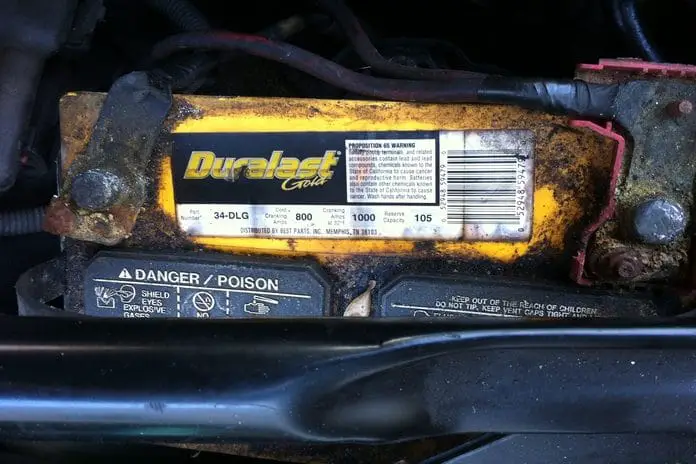
One cold morning my daughter confronted me with this question, “why is my car battery leaking?” That confounded me because, at that moment I really had no idea. Together we searched for answers. In the process of searching, we also learned some important matters related to a leaking car battery which I want to share here with you.
Why does a car battery leak? The main cause of a car battery leak is a damaged cell plate or a crack in the battery’s body. However, there are other reasons including undercharging and overcharging that can cause a battery to leak.
If a battery is not old, overcharged or physically impaired, it should not leak.
A leaky car battery is a dangerous and hazardous substance and a strong indication that you need a new battery. Make sure that you don’t get in contact with it or touch it.
In general, the fluid leaking out of your battery is acid, although the electrolyte is a mix of water and sulphuric acid. The only time a battery will leak water is when you overfill it when you top it off with distilled water.
To fully grasp the reasons why your battery leaks, you must first understand how a battery works.
How Does A Car Battery Work?
Your car battery’s main function is to start your car. It delivers electrical current to your car’s engine to accomplish this feat. As soon as the engine starts running, the job of powering the car’s electrical system is taken over by the alternator.
Majority of the car batteries that are in use today, including yours, I suppose, are lead-acid rechargeable batteries These batteries generally contain six cells arranged in a series circuit. Each cell supplies 2.1 volts so that when fully charged, a battery’s capacity is 12.6 volts.
One battery cell consists of two alternate plates; the anode (made of lead) and the cathode (made of lead plated with lead dioxide). The anode and cathode of a cell are isolated from each other by a separator. The six battery cells are submerged in a solution called electrolyte which is a mixture of water and sulphuric acid.
Lead acid batteries produce electricity to start your car by creating an internal chemical reaction between the plates and the acid solution. When a battery is discharged the acid in the sulphuric solution reacts with the elements of the plates, converting them into lead sulfate.
When the battery is charged or recharged, the process or chemical reaction turns around, changing the sulfate back to lead oxide, and the plates return to their original form.
A leak in the battery can happen once one or more of its six cells are damaged. The leak because of a damaged cell usually oozes through the cell caps on top of the battery, Undercharging or overcharging is the usual cause of a leak in the battery cells.
This is why the use of the right charger is strongly recommended to avoid such a condition. A wrong charger is usually the culprit for improper charging, and this can cause irreversible damage to the battery.
Other Causes Of A battery Leak
Aside from damaged cells and overcharging, here are other reasons why your car battery leaks.
1. A damaged regulator of the alternator
A malfunctioning regulator of the car’s alternator could result in the delivery of too much power to your battery that could cause fast charging. The regulator in the alternator controls the amount of power or number of volts that is generated, If it malfunctions, and the voltage is not controlled, the electrolyte could boil and the acid in the solution could overflow.
2. Excessive fluids in the battery chamber
This applies more to flooded or wet lead-acid batteries that need to be topped off with distilled water periodically. In the act of refilling the electrolyte, you run the risk of overfilling the chambers that could cause the solution to overflow or leak out.
3. Extreme heat
Extreme heat could cause the plates of the battery to expand and push out the electrolyte.
4. Incorrect storage
Batteries should have a full charge before putting it in storage and should be stored in a cool place. If a battery is stored in an unventilated and warm place, it could become overheated and bulge or bloat. A bloated battery has a tendency to crack and cause a leak.
5. Severe cold weather
Another factor that could cause a battery leak is extreme cold during winter. This weather condition can precipitate the freezing of the electrolyte which in turn squeezes the plates and put pressure on the casing. resulting in a leak.
6 Cracks in the battery casing
Too much vibration while driving in a rough, difficult and demanding terrain could create a crack on the battery casing that could be the reason for a leak.
Signs Of A Leaking Battery
If your battery is new, there is very little danger that it will leak, except when it is overcharged or it has a physical defect.
However, as your battery ages, you must watch out for the telltale signs that will tell you if there is a leak in your battery. These signs are quite obvious and easy to observe:
● A crack in the casing and moisture around the crack or fluid trickling from it.
● The battery casing looks swollen, bloated or warped.
● The smell of a rotten egg emanates from the battery
● Your battery is sweating
● Liquid bubbles seeping through the terminal post.
● Corrosion forming around the terminal caps
● The level of battery fluids is always low in spite of it being recently topped off
Can You Repair A Leaking Battery?
A leaking battery is a piece bad news for everyone. It’s not only bad for your car, but your health including the environment is affected by a leaking battery. Once you notice a leak in your battery, even if it’s still performing adequately, attend to it immediately. Have it checked by a seasoned mechanic if you’re not confident of doing the checking yourself.
As a rule, a leaking battery is a damaged battery and should be immediately replaced. However, if upon inspection, you realize that the damage is not extensive, but is only due to a small crack in the wall, then maybe it can still be salvaged.
Repairing a crack in the battery is not easy, but you can always try. Here’s how to do it.
Step 1 – Prepare the materials that you need; sealant, sandpaper, baking soda, plastic pail.
Step 2 – Uncap the battery posts.
Step 3 – Transfer the electrolyte of the battery into a plastic pail or bin. Do it slowly to prevent a spill. Remember, the electrolyte contains sulphuric acid, a substance that could harm you.
Step 4 – Put baking soda on the pail containing the electrolyte to neutralize the sulfuric acid.
Step 5 – Once the battery casing is empty of fluids, sand the cracked area with the sandpaper carefully and thoroughly until the crack is level and smooth to the touch.
Step 6 – Spread the sealant on the cracked surface and give it time to dry.
Step 7 – This next step calls for the reconditioning of the electrolyte. Heat three cups of distilled water to 150°F.
Step 8 – Dissolve a cup of Epsom salt into the heated water and let it cool.
Step 9 – Pour the water with dissolved Epsom salt into the electrolyte.
Step 10 – Transfer the electrolyte back to the battery.
Step 11 – Wipe dry any spill on the surface of the battery. Excess water could bring about corrosion and rust.
Step 12 – Replace the caps on the terminal posts and tightly secure them.
Step 13 – Give the battery a gentle shake for about 5 minutes.
Step 14 – Charge the battery for at least 36 hours using a trickle charger.
Some words of caution: When working with a car battery, make sure that you are fully protected. Wear rubber gloves and goggles. Also, wear a long-sleeved shirt and footwear where your toes are covered.
Work in a well-ventilated area and have a pail of water ready beside you to wash off any spill on your person and douse a fire that could accidentally happen. Remember, you are dealing with acid here, a very dangerous substance that could burn you and could even cause a fire.
Conclusion
Now, my daughter will no longer ask me, “why is my car battery leaking?” She is well aware of why her car battery leaks and she is doing everything to prevent It. Like me, she has been giving her car battery attention that both of us used to ignore in the past.
The saying “an ounce of prevention is better than an ounce of cure” pretty much apply to batteries. A leak in the battery can be prevented with proper maintenance and care, But, if it happens, we know what to do. If the damage is too extensive to be repaired, then the next best thing to do is to have it replaced.





